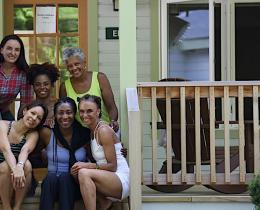When I say the feminine, I don't mean gender. I mean the feminine principle that is living—or suppressed—in both men and women. The feminine principle attempts to relate. Instead of breaking things off into parts, it says, Where are we alike? How can we connect? Where is the love? Can you listen to me? Can you really hear what I am saying? Can you see me? Do you care whether you see me or not?
Now, these are very serious questions. And the feminine is difficult to talk about because so few people have experienced it. The feminine is presence, and relatedness, and a heart that can open so that when you meet another person you actually are seeing that person's authentic self. What meaning does human life have if nobody has ever seen you?
I can't tell you the number of people—men and women—who have sat in my office sobbing, saying, "Nobody ever saw me. Nobody ever had time to listen. So I am unlovable"—the saddest word in the language. Sometimes I've had a real flood of feeling about somebody, and I put out my hand and they say, "Don't touch me. I'm unlovable." And they mean it. As a child, that person was raised where the feminine was not present. You have to experience the feminine to understand it.
Ask yourself: As a child, who saw you? Who heard you? Was there anyone with whom you could be totally yourself and to whom you could trust your heart responses and speak your soul responses? Someone who made you think, "Gosh, I am somebody. They're happy that I'm here."
The great work of our time is to bring the feminine into this culture. And it's not an easy path. How does each one of us contribute? Believe it or not, it's done in the most personal ways. Take time to listen to your dreams, to write them down. Take time to recognize that there are things going on within you that need to be felt, or said, or lived, or grieved. Pay attention to these things both in yourself and in the people in your life. Pay attention to the authentic self.
Now, about that word authentic. It is related to the word author—and you can think of it as being the author of your own self. When you're living your own reality, you become the sovereign of your own life. You know who you are, you speak what you believe. There's a natural pride that goes with that: This is who I am—take me or leave me. Think of Michelle Obama—she is not afraid of her own strength. And since her strength takes nothing away from anyone else—because it is given with love—she is free to be her authentic self.
To me, real power is about presence. It's the energy of knowing that you are who you are, and therefore speaking and acting from your authentic self. It doesn't matter what your work is—if you're a teacher or a nurse or whatever; it is your presence that's the power. It's not power over anybody else. It's just the expression of who you are.
Power in the sense of controlling somebody else is different from personal presence. That kind of power—patriarchal power—does not value other people. What I strive for instead is empowerment.
Love is the real power. It's the energy that cherishes. The more you work with that energy, the more you will see how people respond naturally to it, and the more you will want to use it. It brings out your creativity, and helps everyone around you flower. Your children, the people you work with—everyone blooms.







